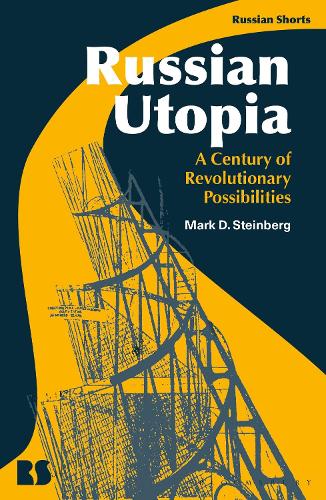
Russian Utopia: A Century of Revolutionary Possibilities
(Hardback)
Available Formats
Publishing Details
Russian Utopia: A Century of Revolutionary Possibilities
By (Author) Professor Mark D. Steinberg
Bloomsbury Publishing PLC
Bloomsbury Academic
16th December 2021
United Kingdom
Classifications
Tertiary Education
Non Fiction
History of ideas
Revolutions, uprisings, rebellions
Revolutionary groups and movements
335.02094709034
Winner of Choice Outstanding Academic Title 2022 (United States)
Physical Properties
Hardback
152
Width 129mm, Height 198mm
281g
Description
Winner of the 2022 Choice Outstanding Academic Titles Mark D. Steinberg explores the work of individuals he recognizes as utopians during the most dramatic period in Russian and Soviet history. It has long been a clich to argue that Russian revolutionary movements have been inspired by varieties of utopian dreaming claims which, although not wrong, are too often used uncritically. For the first time, Russian Utopian digs deeper and asks what utopians meant at the level of ideas, emotions, and lived experience. Despite the fact that many would have resisted the utopian label at the time because of its dismissive meanings, Steinbergs comprehensive approach sees him take in political leaders, intellectuals, writers, and artists (visual, material, and musical), as well as workers, peasants, soldiers, students and others. Ideologically, the figures discussed range from reactionaries to anarchists, nationalists (including non-Russians) to feminists, both religious believers and the militant godless. This innovative text dissects the very notion of the Russian utopian and examines its significance in its various fascinating contexts.
Reviews
[I]ntellectually engaging ... and a stimulating read. * Canadian Journal of History / Annales canadiennes d'histoire *
Steinbergs rich and masterful new book revivifies the utopian mindset. It gives voice to the utopians and utopian impulses that helped shape Russian history. Steinberg refuses to dismiss the ideas and actions of utopians as naive or insincere. Utopia is not presented as a dirty word. It is not understood as a fantastical no-place, but as an inspirational not-yet. Treating utopia as a critical methodas a means questioning and seeking to transform the present state of affairsSteinberg offers a new lens through which to assess the making of modern Russia. The lure of the future and alternative possibilities held particular sway in the seemingly unchanging and unchangeable world of late autocratic Russia. Utopian visions pertaining to flight, the new person, the urban world, and new types of state provide the thematic nodes around which Steinberg structures this wonderfully original study. He presents these nodes as the jumping points from which his subjects made a leap into the great unknowninto an alternative, daring, and audacious future. Steinberg takes us on a delightful and rewarding journey through Russian utopia. The reader is reminded that the present should not be mistaken for the future. Possibilities continue to abound. * Andy Willimott, Senior Lecturer in Modern Russian History, Queen Mary University of London, UK *
Mark Steinberg masterfully unearths the utopian impulse in Russian history, showing how the dream of grasping that which lies just beyond reach motivated tsars as well as commissars, ordinary people alongside famed revolutionaries. In the process, he offers an inspiring rehabilitation of the utopian impulse. Utopia, for Steinberg, is not a quixotic goal, but a critical practice that rejects complacency and defeatism, demanding the promise of a better future in the present. This intelligent and often beautiful book offers a stirring message for our troubled times. * Faith C. Hillis, Associate Professor of Russian History, University of Chicago, USA *
Mark Steinberg breathes new life into utopianism --often dismissed as nave or dangerous-- by showing it to be a more grounded belief in possibilities for improving the world in the face of circumstances ranging from difficult to disastrous. This engaging and illuminating study locates utopian thinking across the political spectrum in modern Russia, in the everyday experiences of ordinary, unsung people as well as in works by more famous visionaries. Rather than fixate on the ultimate failures of some of these ideas, Steinberg shows us the ways that utopianism opened up new avenues for social and political practices of all kinds. * Joan Neuberger, Professor of History, University of Texas at Austin, USA *
Author Bio
Mark D. Steinberg is Professor of History, Director of Graduate Studies and Associate Chair at the University of Illinois, USA. He is the author of several books, including A History of Russia (9th Ed., 2018; co-authored with Nicholas V. Riasanovsky), The Russian Revolution, 1905-1921 (2017) and Petersburg Fin de Sicle (2011). His books have been translated into Portuguese, Japanese and Russian. He is also the co-editor of volumes such as Interpreting Emotions in Russia and Eastern Europe (2011; with Valeria Sobol) and Religion, Morality, and Community in Post-Soviet Societies (2008; with Catherine Wanner).
